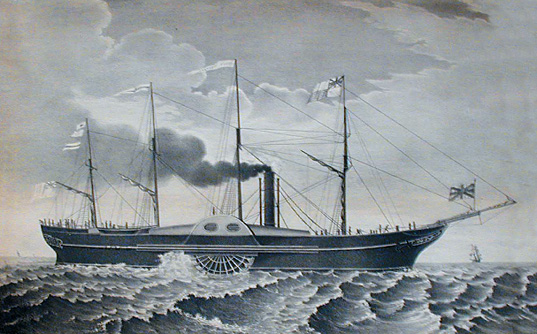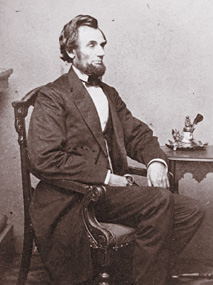 |
|||||||
|
The 1800's:
1
2
3
4
5
6
7
8
9
10
< previous
next >
In 1846, after seeing exclusive news reports in The Herald that they had missed, Hale called upon Bennett to propose an arrangement by which the two papers would share the cost of gathering news from distant points. The men agreed to provide access to each other’s news dispatches. This was the beginning of the New York Associated Press, which would benefit both papers enormously during the soon-to-be-declared Mexican- American War.
Two years later in 1848, after a stormy meeting with four of their jealous New York competitors (including The Tribune and The Times), the Associated Press was formed among the six papers, and Hallock became the organization’s first president. The often-antagonistic publishers realized the mutual benefits the six could realize in sharing the cost of distant newsgathering. The AP partners, longtime rivals in collecting news from inbound ships off New York, quickly arranged for a steamboat out of Halifax, Nova Scotia, to meet ships from Europe, gather what news they had and rush it to Boston and the telegraph link to New York. Soon the AP signed up telegraph correspondents in key U.S. cities, giving the papers a regular flow of news from beyond New York. The Mexican-American War was a milestone in the growth of the American Empire, which had “manifest destiny” as its motto. As its trade empire expanded into the Far East, where it sought to enforce an “open door” policy in China, the U.S. needed a coaling station. In 1854, Commodore Matthew Perry’s squadron of two warships steamed into Tokyo Bay to seek a coaling station in Japan, which had been closed to relations with the outside world for more than 200 years. The two ships, the Mississippi and the Susquehanna, were the first two steamships in the U.S. Navy. On his return, Perry brought back a Japanese cartoon showing the Journal of Commerce telegraph that he had presented to the Japanese during his successful negotiations to open trade relations.
A storm was brewing over slavery. Hallock and Hale had long been members of the National Colonization Society of America, which worked to return “free people of color” to Africa. The members of the Colonization Society all recognized that slavery was wrong. Hallock himself purchased more than 100 slaves and sent them to Liberia. Both Hallock and Hale wanted to see slavery ended by legal means, but they believed outright abolition could not be accomplished without amending the Constitution. As the Civil War approached, Hallock stood by his position that the Union should be preserved any way except through war, a key point that isolated him from growing war sentiments in the North. But the best Constitutional experts held that Congress had no power to abolish slavery anywhere except in the District of Columbia, which the JoC called for editorially. Congress finally abolished slavery in the District in one of the bills that made up the Compromise of 1850. As the Civil War approached, the JoC took a strong stand against secession, but decried the tactics of the ultrawar wing of the Republican Party in favor of conciliation and the gradual elimination of slavery. The ultra-war wing condemned the paper as disloyal, and Hallock was bombarded with anonymous letters threatening him with violence. (Hale had retired in 1849.) It didn’t help that Hallock had organized and spoken at a large meeting in New York supporting the recognition of Southern rights. The JoC’s advocacy of free trade put its views in line with the agrarian, export-oriented South. That generated serious resentment not only in the protectionist- minded Northeast, but in Washington. In 1861, a U.S. grand jury indicted Hallock for disloyalty for publishing articles sympathizing with the Confederacy. The postmaster general suspended the paper’s mail privileges and stated that it couldn’t use the mail unless Hallock resigned as editor. This crippled the paper, as it depended on the mail to deliver half its circulation. The 1800's: 1 2 3 4 5 6 7 8 9 10 < previous next > |
||||||
| © Copyright 2005 United Business Media. All rights reserved. |
|||||||

